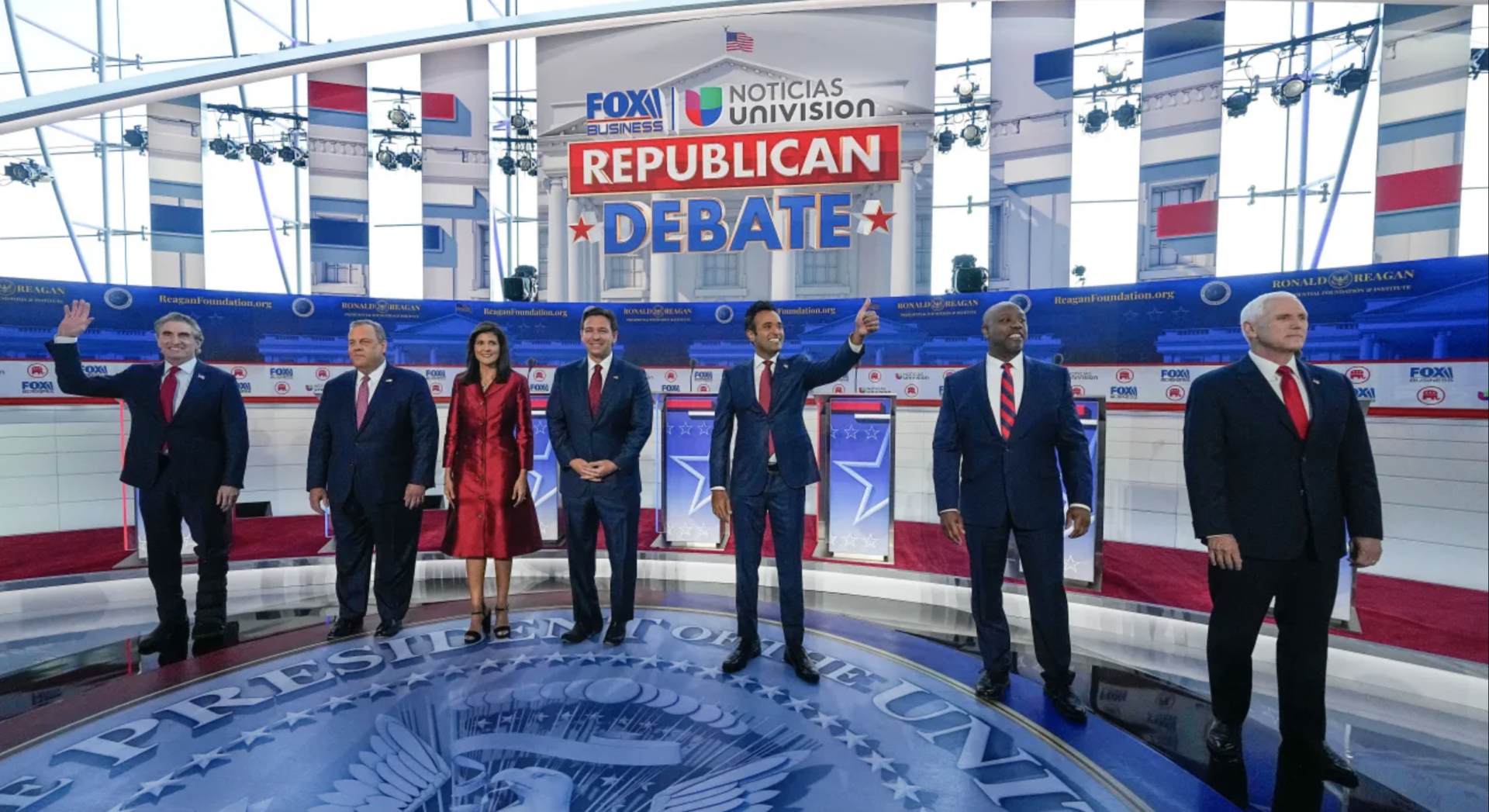There is an urgent need for candidates to present solutions to the larger problems the US has been confronting both domestically and globally.
New Delhi
The recently concluded second Republican Presidential primary debate in the United States has raised more questions than answers regarding the potential candidates from the Grand Old Party (GOP), the Republican Party. There were seven candidates—Florida Governor Ron DeSantis; former Vice President Mike Pence; entrepreneur Vivek Ramaswamy; South Carolina Senator Tim Scott; Former US Ambassador to the UN, Nikki Haley; former New Jersey Governor Chris Christie; and North Dakota Governor Dong Burgum—during the GOP’s primary debate. Each one wanted to underscore a point at the cost of the other. Former President Donald Trump remained an easy target, despite his absence from the debate. All seven, however, could not make much impact in terms of their articulation on a number of issues including immigration and the slowdown of the US economy, as well as the high rates of inflation.
Donald Trump was absent for the second time at this important stop towards reaching a nomination in due course as a Republican Presidential candidate for the 2024 elections. The party’s first Presidential primary debate in August did not lead anywhere in terms of building impact either. Though Vivek Ramaswamy fared well and had certain clarity on the pertinent themes confronting the United States, inconsistency and personal slandering featured prominently during the debate across the Republican candidates. Nikki Haley seemed to be emerging on the radar but was unable to gain much momentum. There was much debate following the first primary as to whether Ramaswamy or Haley would deprive Trump of his third straight Republican presidential nomination.
During the second primary debate, Nikki Haley attempted to bring up major issues and displayed an element of seriousness in terms of coming up with ideas for addressing high inflation and the slowing down of the US economy. On health care, she provided substantive answers in comparison to other candidates. Haley also came down heavily on Ramaswamy’s credentials and very categorically said, “Honestly every time I hear you, I feel a little bit dumber for what you say”.
Ramaswamy was cornered on his posture on TikTok and his affinity with China. Nikki Haley also had a direct spat with South Carolina Senator Tim Scott. What ensued was a former South Carolina Governor versus a South Carolina Senator. Though she demonstrated a broad appeal, whether Haley will appear as an alternative candidate to Trump remains a question for debates and discussions.
All seven candidates put Donald Trump in a less-than-flattering light and went to the extent of saying that Trump had added to the US’ woes. It was because of Trump’s policy that the national debt had gone from bad to worse. There might be a possibility in the current context that Trump’s personal problems might turn highly challenging, the way things are unfolding.
There was also dominant discourse on Obamacare and it seemed the Republicans have now given up on getting rid of former President Barack Obama’s healthcare law. Former Vice President Mike Pence had to duck questions relating to the abrogation of Obamacare. Pence and Donald Trump had promised to get rid of it when they were in power but could not do it because of the Obamacare law’s increasing popularity. Pence very intelligently made a statement that Obamacare funding would be handled by the states.
Florida Governor Ron DeSantis was especially very harsh on Trump and posed a categorical question: “Was Trump skipping debates?”. Chris Christie went to the extent of saying that Trump had put the US into its current $7.8 trillion debt. This perhaps has been the reason for the current inflation in the United States.
Hearing these comments, it seems Trump is not in favour of continuing with the debates. He recently said the Republican National Committee (RNC) should “immediately put an end” to any further primary debates.
Debates on immigration also featured prominently but they did not seem to lead anywhere near comprehensive immigration reforms. Christie and Haley were more concerned with securing the border. Ramaswamy’s idea of revoking birthright citizenship for the children of illegal immigrants was not considered a feasible solution to the immigration problem. Tim Scott, however, was different from the rest. He opined that the 14th Amendment of the US Constitution was meant to address slavery rather than undocumented immigrants. Such action might take a different legal route. Pence virtually had no concrete idea on immigration issues. North Dakota Governor Dong Burgun did not leave much of an impact on any of the issues discussed during the second primary debate.
It is unfortunate but true that there is going to be a leadership crisis in the United States because both the Republicans and Democrats have not been able to orient their next in line. How the United States will get back to the centre stage of global politics remains a moot point. There is an urgent need for the candidates to have a coherent idea and more importantly, to present solutions to the larger problems the US has been confronting both domestically and globally. The societal dimension of the US political system is changing at a faster pace.
Dr Arvind Kumar is a Professor of United States’ Studies at the School of International Studies, Jawaharlal Nehru University (JNU), New Delhi.

